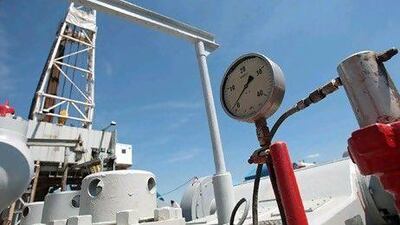Need has compelled the sultanate to try to exploit its hard-to-reach tight gas in a project with BP. Freeing tight gas from the deep rock where it is locked away is a costly and complex task made worse by the presence of toxic gases, but Oman has little choice, writes The National staff
A seven-year appraisal of geologically complex natural gas deposits in Oman has been declared "very encouraging" by BP, raising the prospect of a big new boost for industrial development in the sultanate.
The gas found in the Khazzan and Makarem fields is known as tight gas, meaning it is trapped in rock with low permeability. This makes the process of extraction technically demanding and requires a large number of wells. In the case of Oman, the gas is also up to 5,000 metres deep.
BP says it would have to invest about US$15 billion (Dh55.09bn) to develop the fields, making this the largest project ever undertaken in Oman. In return, the country would gain access to 30 trillion cubic feet of gas, with the first phase of the project aiming for production of 1.2 billion cu ft per day (cfd) from as early as 2015. This would increase Oman's gas production by 40 per cent.
Gas is vital as the prime feedstock for power generation, and subsidised electricity prices have led to big increases in its use over the years, with supply not catching up. One of the key consumers of power is industry, the growth of which governments across the region are keen to promote. The sultanate has not been spared the popular unrest that has swept through the Middle East. As unemployment was one of the main causes of discontent, there is now added pressure to provide work. "The big agenda right now is around job creation," Jonathan Evans, the BP general manager for exploration in Oman, said when revealing the test results.
Oman has been hamstrung by a lack of easily accessible gas. Earlier this year, the oil and gas ministry said the government had frozen new industrial projects until the energy supply has been guaranteed.
"The tightness in gas feedstock and power supplies has hampered Oman's industrial and general economic growth, badly damaging efforts to grow the non-oil part of the economy and diversify away from a dependence on hydrocarbon production and export," says Samuel Ciszuk, an energy analyst at IHS Global Insight.
Oman's GCC neighbours have also made gas production a priority, even taking on technically challenging projects. In Abu Dhabi, the US company Occidental Petroleum is developing the Shah sour-gas field, a technologically demanding undertaking because of the high sulphur content of the natural gas there. Once the development is complete in 2014, Shah is expected to yield 1 billion cfd - 540 million cu ft of de-sulphurised gas.
"Policymakers across the region appear to have realised the urgency for new gas initiatives over the last few years. Gas exploration and production is now clearly a priority," says John Tottie, an analyst at HSBC. But governments must pay the energy companies that extract the gas a price that justifies their investment. The development of another Omani tight-gas field, Abu Butabul, was not pursued after BG Energy, a British company that undertook the exploration, walked out after failing to agree on a price.
BP has yet to work out an agreement with the Omani government. A full field development plan would be completed "early next year, and on the basis of that, [BP] will then negotiate commercial terms", Mr Evans says.
Gas from the Khazzan and Makarem fields will not come cheap. "Capital and operating costs could likely be in excess of $2 per million British thermal units [MBTU] - too high to make the project viable based on current regulated gas prices and fiscal terms," Mr Tottie says.
The analysts believe the government will have learnt its lesson.
"Although much of the commerciality challenge of its Abu Butabul field lay in its comparatively small size, the walkout was still a wake-up call, and the popular protests at the start of the year will have further impressed on the government that the importance of the project for the sultanate is too high to let negotiations about the margins allow the project to fall through," Mr Ciszuk says.
Any deal that Oman strikes with BP should still be less costly than obtaining gas from other sources. HSBC says the UAE recently bought gas on the international market for an estimated $11 per MBTU.
While Oman has a pressing need to tap the gas at its disposal, BP is also keen to move ahead with a project in which it has already invested about $600 million. Should it go ahead, it would be one further step in a shift from crude production to a more balanced portfolio.
For international oil companies, getting their hands on crude is increasingly difficult. Half the world's proved crude reserves lie in Saudi Arabia, Kuwait, Iraq and Iran, all of which are either off-limits or difficult to operate in.
"They can't get access to the cheap reserves, so they are looking for alternative ways to make money. For them there are only three games in town. One is deepwater offshore, the other is unconventional oil and the third is gas. Of those three, gas is the favoured option," says Prof Paul Stevens, a senior research fellow at Chatham House.
Fortunately for companies such as BP, global demand for gas is increasing three times as fast as demand for oil, and they can make use of their technical expertise to feed this growing market.

